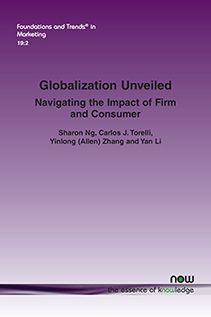Globalization Unveiled: Navigating the Impact of Firm and Consumer
By Sharon Ng, Nanyang Technological University, Singapore, angsl@ntu.edu.sg | Carlos J. Torelli, University of Illinois at Urbana-Champaign, USA, ctorelli@illinois.edu | Yinlong (Allen) Zhang, University of Texas at San Antonio, USA, yinlong.zhang@utsa.edu | Yan Li, Nanyang Technological University, Singapore, y_li@ntu.edu.sg
Abstract
The phenomenon of globalization has been shaping the world economy and societies for centuries. However, a renewed interest in understanding its impact on marketing and consumers has come into the spotlight in recent years as the COVID-19 pandemic has shown how interdependent the world is. In addition, anti-globalization sentiment is growing worldwide. We believe this is a good time to take stock of the impact of globalization on businesses (especially on positioning and marketing strategies) and consumers’ responses. The aim of this monograph is to provide an overview of globalization as a phenomenon that affects business activities and consumer behavior. Upon providing a brief history of globalization and identifying the key aspects of its conceptualization, we review the impact on the emergence of a global consumer culture, the positioning and marketing strategies adopted by firms, the reactions of consumers to globalization itself (i.e., their attitudes toward it and their identity shifts) and to the diversity of products and services available in a global marketplace, and the idiosyncratic ways in which globalization affects some key industries (e.g., technology, consumer goods, and media and entertainment) and countries. We conclude with a discussion on the need for research to further understand the impact of globalization on consumption, the opportunities at the intersection of globalization and technology development, and the effects of globalization on sustainable business practices.
Globalization Unveiled: Navigating the Impact of Firm and Consumer
Globalization Unveiled: Navigating the Impact of Firm and Consumer explores the multifaceted area of globalization and examines its impact on consumer behavior and marketing strategies. The authors review how the forces of globalization can influence the activities of companies and the decisions of consumers. Globalization is fundamentally changing the way people think about themselves and how they respond to cultural representations in the environment, which is the focus of the current review. The monograph begins with a brief history of globalization to provide the context for introducing its definition. Next, it reviews how globalization impacts consumer behavior and broadens the discussion to consequences for industries and countries. It concludes by taking a look into the future and discussing knowledge gaps and how globalization intersects with existing technological developments and sustainability movements.
